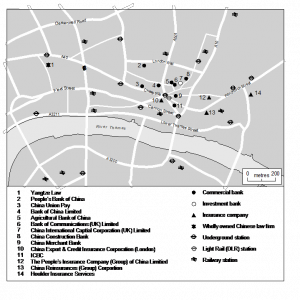
December 3, 2019, by Irena Hulova
Engaging in Whitehall: learning through uncertain times
Written by Sarah Hall, Professor of Economic Geography, School of Geography, sarah.hall@nottingham.ac.uk
At the end of October, I was invited to deliver a masterclass on the impacts of Brexit for the UK’s financial services sector at the Foreign and Commonwealth Office (FCO). When I received the invitation, I was particularly excited because it allowed me to share findings from my two current research projects. First, through my affiliation with the UK in a Changing Europe, I’m exploring the impacts of Brexit on the UK’s domestic financial services sector. Second, through work funded by the British Academy and in conjunction with the University’s Asia Research Institute, I’ve been exploring UK-Sino cooperation in financial trade, and particularly the importance of London’s financial district within this. These projects may seem rather distant. However, changes in the UK’s trading relationship with the EU will shape the nature of the UK’s financial services sector both domestically and in terms of its wider position within the international financial system.
My invitation came at a time of marked uncertainty both for the financial services sector that I research, and for the Whitehall audience I was meeting. Shortly prior to my trip, a further extension to the UK’s planned departure from the EU had been requested under Article 50 and a General Election had been called. This uncertainty may appear to reinforce assumptions frequently made about the differences between Whitehall and social scientific research that are argued to make effective engagement more difficult. These differences can be summarised as centring on differences in the speed and approach to knowledge production in the two communities. Stereotypes would have it that whilst academics carefully develop nuanced arguments and in-depth research over years, Whitehall demands knowledge at a fast tempo, requiring information to inform and enhance the production and evaluation of policy.
In preparing for my briefing, I reflected on strategies that I’ve learnt through academic peers, wider stakeholders, as well as more formal training, in order to enhance the dialogue and engagement between these two communities. It struck me that the importance of each of these becomes heightened in periods of uncertainty. Three such strategies stand out as being of particular importance.
- Engagement is part of the research process. Engaging with Whitehall, in common with other stakeholders, is a key part of the research process, not something that takes place at the end of a research project. This is particularly important when you are working in a fast moving policy arena such as Brexit. Some of the key areas of research that I focus on have come directly from conversations I’ve had with policy makers in a range of settings and organisations. One of these foci concerning the impacts for financial services beyond London was one of the key issues I wanted to discuss in this meeting.
- Engagement is a two way conversation. It is important to ask your audiences how you can help them. For example, prior to my meeting I asked what aspects of my research they would they find most helpful to hear about? What are they working on at the moment?
The benefit of these discussions meant that I provided more details I could cover from my research to the audience, civil servants not just from the FCO but from across Whitehall, and I worked with my host to decide what would be most valuable to focus on.
- Presentation of the detail matters. Being flexible on the focus of your engagement does not mean discussing the issues only at a general level. In my experience, detail on specific issues that are of relevance and interest to your audience are critical to successful engagement. This also means thinking about how to effectively share this detail. As academics, we receive considerable training and feedback on our written communication but I think the quality of visual material including figures, tables, charts and maps (I’m a geographer!) need equal attention (fittingly, I spoke in the FCO Map Room where map cabinets extended to the ceiling across one side of the room)
These strategies are by no means new and aren’t unique to the process of engagement and policy impact. However, they serve as a reminder of the importance of adopting a flexible, rigorous and clear approach to engagement, just as you would to other forms of discussion and debate. My experience suggests that these basics become even more important at times of uncertainty when you are engaging within a highly dynamic policy domain.
Figure 1 Location of main Chinese financial institutions operating in London
Source: Author’s research

No comments yet, fill out a comment to be the first

Leave a Reply